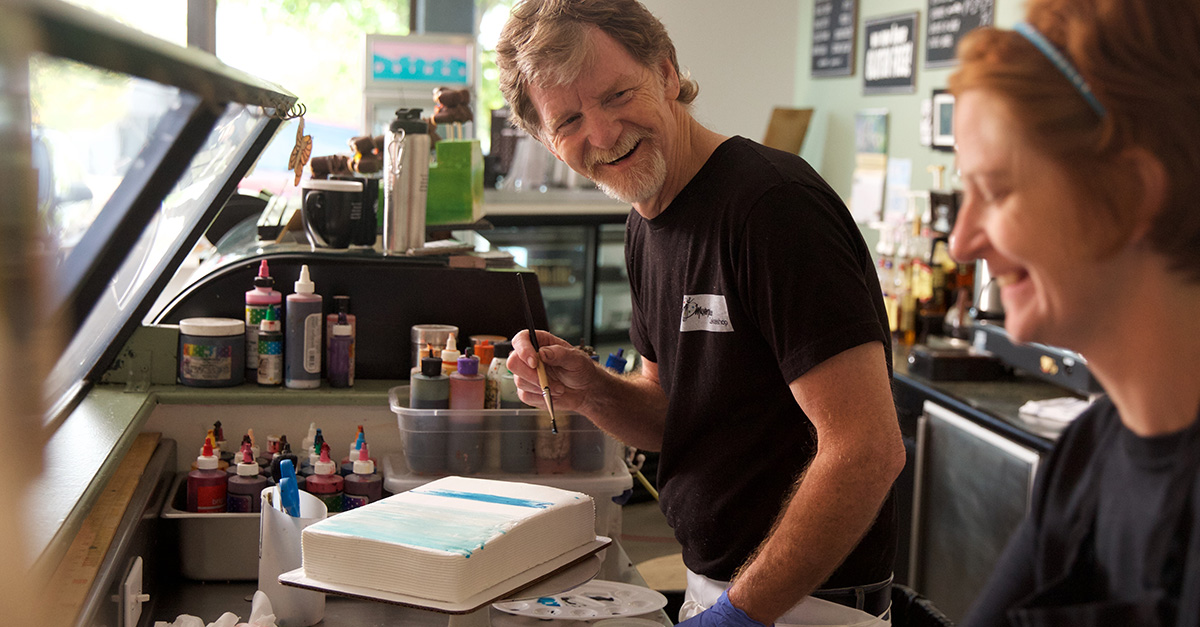


Get a free copy of Parental Rights & Education when you subscribe to our newsletter!

UPDATE: After more than a decade of being sued for refusing to bake cakes that celebrate activities he disagrees with, Christian cake artist Jack Phillips will have his most recent case heard by the Colorado Supreme Court.
This past June, the Supreme Court ruled in the case of 303 Creative v. Colorado Civil Rights Commission that CADA is unconstitutional because government does not have the right to “compel an individual to create speech” that he or she “does not believe.” Furthermore, the Court stated that this protection covers artists who offer “speech for pay” and “all manner of speech” including “artwork” and “symbols.”
In the wake of that decision, Alliance Defending Freedom, which has represented Phillips in all of his cases, sent a letter on July 18 asking the Colorado Supreme Court to review the case, vacate the appellate decision, and rule in favor for Jack Phillips.
“We are grateful that the Colorado Supreme Court will hear Jack Phillips’ case to hopefully uphold every Coloradan’s freedom to express what they believe,” said ADF Senior Counsel Jake Warner. “Jack has been targeted for years by opponents of free speech, and as the U.S. Supreme Court recently held in 303 Creative v. Elenis, no one should be forced to express messages they disagree with.”
{Published January 26, 2023} Five years after The U.S. Supreme Court ruled in favor of Jack Phillips in Masterpiece Cakeshop v. Colorado Civil Rights Commission, Phillips is appealing a second case against him after the Colorado Court of Appeals ruled that he must custom-design a gender transition cake against his religious beliefs.
A panel of three judges on the Colorado Court of Appeals ruled earlier today in the case of Scardina v. Masterpiece Cakeshop that Phillips, a devout Christian, has no constitutional right to refuse to bake a cake celebrating a gender transition and must do so in violation of his faith.
Alliance Defending Freedom (ADF), which represents Phillips, is appealing on First Amendment grounds that the government cannot compel speech.
Jack Phillips has been dealing with the legal system for more than a decade now. In 2012, a same-sex couple asked him to bake a cake celebrating their wedding, but Phillips refused on religious grounds. The case, Masterpiece Cakeshop v. Colorado Civil Rights Commission, eventually went all the way to the Supreme Court, which ruled that the state had actually discriminated against Phillips for his religious views. The court ruled on very narrow grounds, however, and did not provide any future constitutional protection for Phillips.
On the same day that the Supreme Court announced that it was going to hear Phillips’ case, a transgender activist called Phillips’ bakery with the express intent of testing him.
Attorney Autumn Scardina, a biological male who identifies as female, claimed that he wanted to test whether Phillips would serve LGBT people. Scardina asked the store to create a custom cake that had pink on the inside and blue on the outside, but also let the employees know that the cake was intended to celebrate his gender transition.
Phillips informed Scardina that he could not make the custom cake because the message violated his religious beliefs. Scardina called again, this time asking Phillips to make a cake showing Satan smoking marijuana to “correct his thinking.” Phillips refused to bake this cake on the same grounds. Scardina then claimed that Phillips had discriminated against him under the Colorado Anti-Discrimination Act (CADA) and filed suit.
Phillips has stated that his refusal to make the custom cakes is not due to who requests them but what the message conveys.
In December, the Supreme Court heard oral arguments in the case of 303 Creative v. Elenis, which could finally decide whether the government can force artists or other Americans to express speech or beliefs that they don’t want to express. The plaintiff in the case, Lorie Smith, is a website designer and devout Christian who realized that if she started providing websites for weddings, she would be subject to the same type of punishment that Phillips was experiencing under the Colorado Anti-Discrimination Act if she refused to create sites celebrating same-sex marriages. She is also being represented by ADF.
Alliance Defending Freedom senior counsel Jake Warner, who has been arguing Phillips’ current case, said of the Colorado appellate decision today:
“Free speech is for everyone. No one should be forced to express a message that violates their core beliefs. Over a decade ago, Colorado officials began targeting Jack, misusing state law to force him to say things he does not believe. Then an activist attorney continued that crusade. This cruelty must stop. One need not agree with Jack’s views to agree that all Americans should be free to say what they believe, even if the government disagrees with those beliefs.
The same law being used to punish Jack is also at issue now at the U.S. Supreme Court in 303 Creative v. Elenis and the Court there should reject Colorado’s attempt to mandate orthodoxy and drive views it disfavors from the public square and affirm that graphic artist Lorie Smith and all artists—writers, painters, photographers, filmmakers, calligraphers, cake artists, and more—have the right to create freely without fear of government punishment. Cultural winds may shift, but freedom of speech is foundational to our self-government and to the free and fearless pursuit of truth.”

The Supreme Court’s failure to address the core of the problem in Phillips’ first case has led to his continued legal battles. Had the Supreme Court simply upheld Phillips’ right to refuse to express a message that violated his beliefs, he would not still be struggling against activists who want to force him to embrace their beliefs.
Who is actually being discriminated against? Phillips spent several years in court for simply refusing to create a wedding cake for a homosexual wedding because it violated his religious beliefs. Immediately upon hearing that Phillips’ case would go to the Supreme Court, though, a lawyer and transgender activist targeted Phillips because of his religious beliefs, specifically setting up the request in order to create another lawsuit.
Being asked to design a cake for a transgender person and being asked to create one to celebrate a gender transition are two different things. Scardina told Phillips the cake was to celebrate his transition, expressing the message that on the outside he looks like a male, but inside he is really female.
2 Timothy 3:10-12 says,
“Now you followed my teaching, conduct, purpose, faith, patience, love, perseverance, persecutions, and sufferings, such as happened to me at Antioch, at Iconium and at Lystra; what persecutions I endured, and out of them all the Lord rescued me! Indeed, all who desire to live godly in Christ Jesus will be persecuted.”
This faithful Christian man is now entering a second decade of being persecuted for his religious beliefs and still he stands firm. Phillips has not pushed his religious views on LGBT persons, but LGBT activists and the government are intent on punishing him simply for holding those views. They refuse to allow Phillips to quietly adhere to his own beliefs. Instead, they have targeted him through the legal process in an attempt to force him, and everyone else, to submit to and affirm their beliefs.
This is a distasteful denial of religious liberty and freedom of speech, and the courts must take the opportunities before them to stop it right now.
Ready to dive deeper into the intersection of faith and policy? Head over to our Theology of Politics series page where we’ve published several long-form pieces that will help Christians navigate where their faith should direct them on political issues.

Notifications